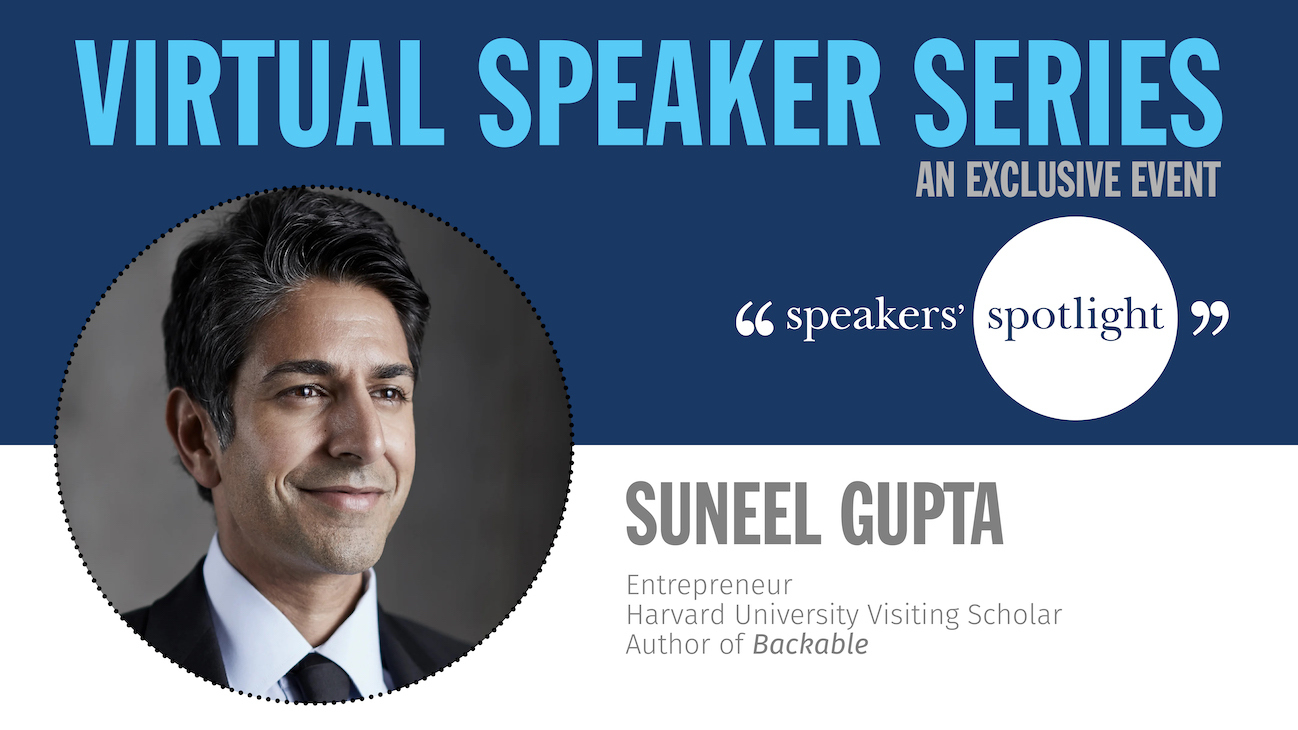Joining us for this week’s Virtual Speaker Series session, entrepreneur Suneel Gupta offered a look at the intriguing findings he discovered over the course of writing his new book, Backable. The conversation led us from understanding what exactly it means to be “backable” in business and life and why that matters, to tips and strategies to make ourselves and our work more backable.
So, what exactly does Suneel mean when he talks about being backable? It’s not a specific, singular quality, but rather a compilation of (sometimes hard to define) qualities and skills that make others want to take a chance on our product/idea/project/etc. Suneel said we’ve all seen examples of this in our lives, where the people who are not the obvious choice still find support anyway. It’s not simply a matter of talent, popularity, or even pure charisma but something more intangible. And yet, in his work, Suneel pointed to the fact that many of the backable stories he uncovered showed that becoming backable was something that people learned to do—it’s not something innate.
A quick note: While it might be easier to consider this concept from an individual point of view – for example the classic tech entrepreneur success story – Suneel was clear that we can become backable both inside and outside existing organizations, and organizations themselves can become backable. The bottom line is all about having an ambition and getting other people to come along for the ride, whether that’s upper management in a large organization taking a chance on a new idea, investors putting startup money forward for a new project, or customers willing to purchase an innovative product.
Suneel put forward a quick summary of what he found to be the Seven Learned Qualities of Backable People. Once again, these develop overtime and can be harnessed by anyone.
- Convince Yourself First
- Cast a Central Character – Develop your storytelling skills
- Find an Earned Secret – What’s something that you can offer from your unique experience/work
- Play Exhibition Matches – Practice pitching your ideas in safe, low stakes situations
- Flip Outsiders to Insiders
- Make it Feel Inevitable – Humans are not natural risk takers. Give people a reason to take a chance
- Let Go of Your Ego
While Suneel’s book goes into detail on each of these points, for our session he focused most of his discussion on three: Flip Outsiders to Insiders, Convince Yourself First, and Playing Exhibition Matches. He also provided a helpful PDF summary guide for these three points, with important takeaways highlighted.
Flip Outsiders to Insiders
To begin our in-depth look at some of the backable qualities, Suneel shared why it’s important to take outsiders and turn them into insiders on our ideas and our projects. He said that most often we think of innovation as a two-step process: have a great idea and then execute on it well. In reality, there’s a hidden third step, where we need to bring people on board to create and support what we’re trying to do.
Suneel referenced the idea of the “IKEA effect” on this part of the backable strategy. That effect is based around how people value something more when they have a chance to be part of the process. He said that backable people tend to share a high-level vision and allow people to fill in some of the blanks, to put together the important information for themselves. To bring outsiders in, we want to say “we have 95% of the ingredients, but you have something that I need,” Suneel said.
Convince Yourself First
Here we returned to the idea of the importance of charisma, and how much that factors into the idea of becoming backable. Suneel said that he himself went into the his work on the book expecting to find that all backable people are charismatic, charming, and great public speakers. That wasn’t the case at all. Instead of charisma, he said it was instead conviction that helped to hook potential buyers and investors. A well-developed idea with confidence behind it is the goal.
To get to that point, Suneel said, backable people make sure to take time to incubate their ideas. They don’t just toss out a new possibility in a casual passing conversation. Suneel said the idea doesn’t have to be perfect, but it should be substantive and we should take the time to figure out what people will ask and what roadblocks might stand in our way. However, too much incubation time can be a problem of its own. If we sit on a great idea forever, it might go to waste or maybe someone will even get there first. As a strategy, he suggested giving yourself a deadline by booking a conversation with a trusted friend. “Give me two weeks and then I want to share my new idea with you,” Suneel said.
Play Exhibition Matches
Further to this idea of pitching in a safe, friendly context, Suneel moved onto the idea of “playing exhibition matches” with our ideas. An example of this would be the conversation with a friend mentioned above, or maybe team-level meeting in an organization before going to speak to senior leadership. Suneel said that no venue is too small, and we should take every opportunity to practice. According to his research, backable people play an average of 21 exhibition matches when they’re developing something new.
This naturally leads to a concern about sounding robotic and over-rehearsed when it comes time for the real pitch. Instead, Suneel said, all this groundwork should help us internalize what we’re trying to present. Knowing what we’re talking about backward and forward, having encountered questions from all kinds of perspectives should make us feel more confident and present our ideas with a natural quality.
With these last two ideas, Suneel highlighted the importance of having friends and colleagues we can turn to while trying to do this work. He said most backable people tend to have a circle around them that they can rely upon. Suneel even provided a breakdown of the kind of people that we should ideally have in our corner.
The Four Cs in Our Circle
Collaborator: You work together with this person directly, as they help you expand your idea and prepare your pitch.
Coach: This person knows you well and can provide guidance. Is this idea good for you? Not everything is a right fit and sometimes it takes outside perspective to help us see.
Cheerleader: Someone to hype you up and give you a confidence boost when it’s crunch time.
Cheddar/Critic: Suneel referenced the character of Cheddar from the movie 8 Mile, Eminem’s best friend who challenged him and questioned his decisions. This trusted person helps prepare us for the challenges of the real thing.
Wrapping up, Suneel took some questions. A particular highlight was regarding the effectiveness of these ideas in a larger organization. Suneel pointed to his experience in some major corporations before becoming an entrepreneur, and how he understood the kind of stasis and inertia that can take hold in large companies. He said that sometimes people in these kinds of organizations need advice on how to be backable even more than an entrepreneur or startup. He also reminded us that it’s important to consider how we can help make the people around us more backable as well.
Suneel Gupta went from being the face of failure in the pages of the New York Times to being the “New Face of Innovation” for the New York Stock Exchange. In his new book, Backable: The Surprising Truth Behind What Makes People Take a Chance on You, he distills an important approach to business that relies not on connections or raw talent but the ability to persuade others to take a chance on potential. The book is rooted in Gupta’s journey of discovery from a twice-failed entrepreneur to a leader behind two IPOs. In his presentations, he shares both hard-earned wisdom and the deft understanding of modern business that helped him succeed.
Speakers’ Spotlight has been offering virtual presentations since 2009. We work with a range of speakers who are comfortable with presenting virtually on a variety of topics. If interested, contact us for more information.




